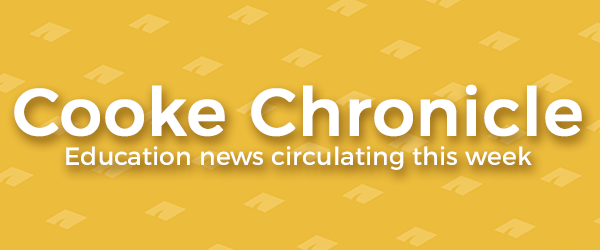School Funding & Food Insecurity

December 1, 2017 – Here’s our weekly roundup of education news you may have missed. Think tanks analyze state K-12 funding, while higher education organizations advise on addressing campus food and housing insecurity.
Receive the Cooke Chronicle each week in your inbox: Subscribe here.
Elementary & Secondary Education:
- Dual enrollment programs for high school students should focus on course rigor, value, equity, and transparency about the college credit transfer process, states a new College Board report summarized in Education Week.
- State and local revenue account for the majority of public school funding. TheCenter on Budget and Policy Priorities reports that the latest data show that in 2015, 29 states still had not restored their per-pupil funding to pre-recession levels. Read more about how school funding formulas work in the Urban Institute’s latest report.
Higher Education:
- In The Washington Post, financial aid advocates share their concerns about the increase of FAFSA verification requests – which have doubled at some institutions – noting it could discourage low-income and first-generation students from applying to college.
- Achieving the Dream outlines a strategy for community colleges to implement on-campus food pantries and connections to social services to address student needs. A related article from NASPA suggests ideas for student affairs professionals looking to address housing and food insecurity at their institutions.
- “If you don’t have money for college, how far can ‘grit’ get you?” Minnesota Public Radio examines the question with Center for Artistry and Scholarship Executive Director Linda F. Nathan.
- The Wall Street Journal lists five “sweeping” changes contained in the current House of Representatives version of the Higher Education Act reauthorization.
Cooke Foundation Highlights:
- Recommendations from our “Making College Affordable” report are detailed in Education Dive: “Schools can help in a variety of ways, including campus vouchers to help students buy books and food at campus stores or dining halls; completion scholarships to cover outstanding balances so students can graduate; emergency loans; food pantries; or grants that may or may not be tied to criteria related to academic standing.
- Cooke Scholar Santiago Tobar Potes writes that he is “inexpressibly grateful” for his education. His commentary for Forbes emphasizes that “it is one’s access to quality education that most directly impacts the course of one’s life.”
- Resources from the Cooke Foundation are linked to in Student Loan Hero’s advice for building a college list, as well as the Belin-Blank Center blog.
Social Media Spotlight: